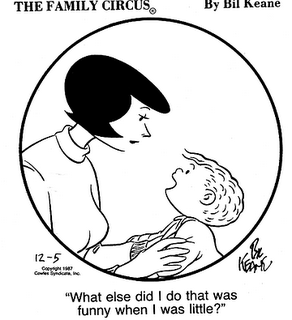5 Reasons NOT to Say "Good Job" to Your Child
 I thought this was an interesting article. I don't know how much I actually agree with it but it's food for thought.....
I thought this was an interesting article. I don't know how much I actually agree with it but it's food for thought.....Five Reasons to Stop Saying "Good Job!"
By Alfie Kohn
NOTE: An abridged version of this article was published in Parents magazine in May 2000 with the title "Hooked on Praise." For a more detailed look at the issues discussed here, please see the books
Punished by Rewards and Unconditional Parenting.
Hang out at a playground, visit a school, or show up at a child’s birthday party, and there’s one phrase you can count on hearing repeatedly: "Good job!" Even tiny infants are praised for smacking their hands together ("Good clapping!"). Many of us blurt out these judgments of our children to the point that it has become almost a verbal tic.
Plenty of books and articles advise us against relying on punishment, from spanking to forcible isolation ("time out"). Occasionally someone will even ask us to rethink the practice of bribing children with stickers or food. But you’ll have to look awfully hard to find a discouraging word about what is euphemistically called positive reinforcement.
Lest there be any misunderstanding, the point here is not to call into question the importance of supporting and encouraging children, the need to love them and hug them and help them feel good about themselves. Praise, however, is a different story entirely. Here's why.
1. Manipulating children. Suppose you offer a verbal reward to reinforce the behavior of a two-year-old who eats without spilling, or a five-year-old who cleans up her art supplies. Who benefits from this? Is it possible that telling kids they’ve done a good job may have less to do with their emotional needs than with our convenience?
Rheta DeVries, a professor of education at the University of Northern Iowa, refers to this as "sugar-coated control." Very much like tangible rewards – or, for that matter, punishments – it’s a way of doing something to children to get them to comply with our wishes. It may be effective at producing this result (at least for a while), but it’s very different from working with kids – for example, by engaging them in conversation about what makes a classroom (or family) function smoothly, or how other people are affected by what we have done -- or failed to do. The latter approach is not only more respectful but more likely to help kids become thoughtful people.
The reason praise can work in the short run is that young children are hungry for our approval. But we have a responsibility not to exploit that dependence for our own convenience. A "Good job!" to reinforce something that makes our lives a little easier can be an example of taking advantage of children’s dependence. Kids may also come to feel manipulated by this, even if they can’t quite explain why.
2. Creating praise junkies. To be sure, not every use of praise is a calculated tactic to control children’s behavior. Sometimes we compliment kids just because we’re genuinely pleased by what they’ve done. Even then, however, it’s worth looking more closely. Rather than bolstering a child’s self-esteem, praise may increase kids’ dependence on us. The more we say, "I like the way you…." or "Good ______ing," the more kids come to rely on our evaluations, our decisions about what’s good and bad, rather than learning to form their own judgments. It leads them to measure their worth in terms of what will lead us to smile and dole out some more approval.
Mary Budd Rowe, a researcher at the University of Florida, discovered that students who were praised lavishly by their teachers were more tentative in their responses, more apt to answer in a questioning tone of voice ("Um, seven?"). They tended to back off from an idea they had proposed as soon as an adult disagreed with them. And they were less likely to persist with difficult tasks or share their ideas with other students.
In short, "Good job!" doesn’t reassure children; ultimately, it makes them feel less secure. It may even create a vicious circle such that the more we slather on the praise, the more kids seem to need it, so we praise them some more. Sadly, some of these kids will grow into adults who continue to need someone else to pat them on the head and tell them whether what they did was OK. Surely this is not what we want for our daughters and sons.
3. Stealing a child’s pleasure. Apart from the issue of dependence, a child deserves to take delight in her accomplishments, to feel pride in what she’s learned how to do. She also deserves to decide when to feel that way. Every time we say, "Good job!", though, we’re telling a child how to feel.
To be sure, there are times when our evaluations are appropriate and our guidance is necessary -- especially with toddlers and preschoolers. But a constant stream of value judgments is neither necessary nor useful for children’s development. Unfortunately, we may not have realized that "Good job!" is just as much an evaluation as "Bad job!" The most notable feature of a positive judgment isn’t that it’s positive, but that it’s a judgment. And people, including kids, don’t like being judged.
I cherish the occasions when my daughter manages to do something for the first time, or does something better than she’s ever done it before. But I try to resist the knee-jerk tendency to say, "Good job!" because I don’t want to dilute her joy. I want her to share her pleasure with me, not look to me for a verdict. I want her to exclaim, "I did it!" (which she often does) instead of asking me uncertainly, "Was that good?"
4. Losing interest. "Good painting!" may get children to keep painting for as long as we keep watching and praising. But, warns Lilian Katz, one of the country’s leading authorities on early childhood education, "once attention is withdrawn, many kids won’t touch the activity again." Indeed, an impressive body of scientific research has shown that the more we reward people for doing something, the more they tend to lose interest in whatever they had to do to get the reward. Now the point isn’t to draw, to read, to think, to create – the point is to get the goody, whether it’s an ice cream, a sticker, or a "Good job!"
In a troubling study conducted by Joan Grusec at the University of Toronto, young children who were frequently praised for displays of generosity tended to be slightly less generous on an everyday basis than other children were. Every time they had heard "Good sharing!" or "I’m so proud of you for helping," they became a little less interested in sharing or helping. Those actions came to be seen not as something valuable in their own right but as something they had to do to get that reaction again from an adult. Generosity became a means to an end.
Does praise motivate kids? Sure. It motivates kids to get praise. Alas, that’s often at the expense of commitment to whatever they were doing that prompted the praise.
5. Reducing achievement. As if it weren’t bad enough that "Good job!" can undermine independence, pleasure, and interest, it can also interfere with how good a job children actually do. Researchers keep finding that kids who are praised for doing well at a creative task tend to stumble at the next task – and they don’t do as well as children who weren’t praised to begin with.
Why does this happen? Partly because the praise creates pressure to "keep up the good work" that gets in the way of doing so. Partly because their interest in what they’re doing may have declined. Partly because they become less likely to take risks – a prerequisite for creativity – once they start thinking about how to keep those positive comments coming.
More generally, "Good job!" is a remnant of an approach to psychology that reduces all of human life to behaviors that can be seen and measured. Unfortunately, this ignores the thoughts, feelings, and values that lie behind behaviors. For example, a child may share a snack with a friend as a way of attracting praise, or as a way of making sure the other child has enough to eat. Praise for sharing ignores these different motives. Worse, it actually promotes the less desirable motive by making children more likely to fish for praise in the future.































